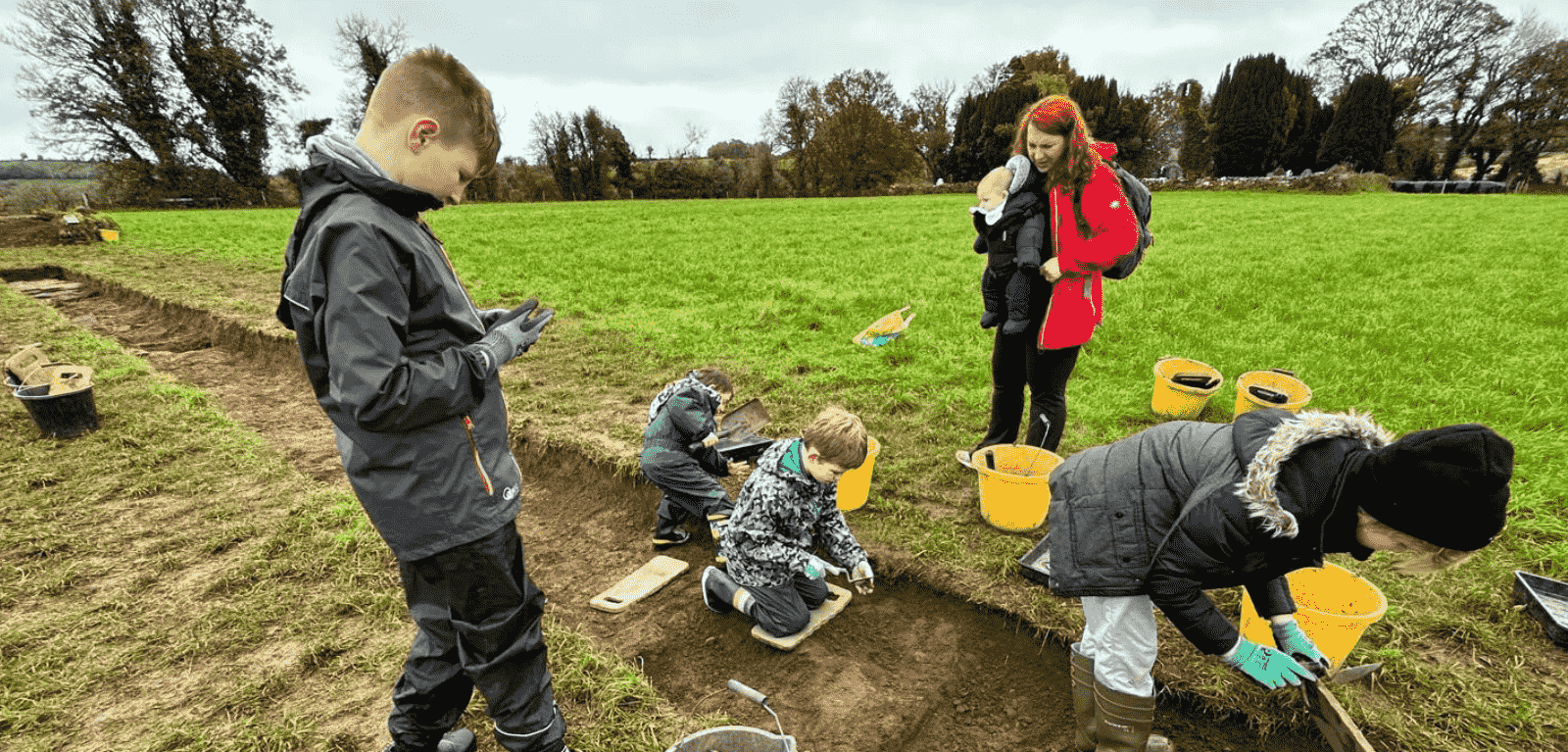Queen’s archaeologists work with school children and volunteers to uncover 9,000-year-old settlement
Archaeologists from Queen’s University, alongside school children and community volunteers, have unexpectedly found evidence of a 9,000-year-old settlement.

They had initially been searching for the ruins of 400-year-old Derrygonnelly Castle in Fermanagh, during a two-week community excavation.
To their surprise, they uncovered artefacts dating back to the Mesolithic period.
The excavation was led by the Community Archaeology Programme Northern Ireland (CAPNI) and funded by the National Lottery Heritage Fund.
‘Mind-blowing’
Professor Eileen Murphy explains: “We are absolutely delighted with what we’ve been able to uncover during the excavation – it is mind-blowing. With the help of almost 250 school children and 35 volunteers, we found much more than we ever imagined.
“We found lots of 17th-century material remains, including imported pottery from England, fragments of clay pipe, building materials and a possible William and Mary ½ penny."
Professor Murphy adds: “We also found a 17th-century ditch that was potentially a temporary defensive feature when the castle was being built.”
What was hugely exciting and unexpected, however, were finds of flint and chert tools of Early Mesolithic date from around 9,000 years ago.
‘Very exciting’
Professor Murphy says: “We now know that hunter-gatherer people were actually living at this location and probably had a seasonal camp there. That is very exciting!
“We also found evidence of a prehistoric round house, which dates to the Early Bronze Age period, around 4,000 years. We know this because we found a large fragment of diagnostic pottery at the base of one of the post-holes of the house.”
The CAPNI team also welcomed Chair of Fermanagh and Omagh District Council (FODC), Councillor Barry McElduff, Kellie Beacom and Melissa Birney from FODC and Pat Cullen, Sinn Féin MP for Fermanagh and South Tyrone.
Cllr Barry McElduff, Chair of Fermanagh and Omagh District Council, comments: “I was honoured to visit the CAPNI archaeological excavation in Derrygonnelly and it was both a memorable and exciting experience."
He adds: “It was inspiring to see local volunteers and schoolchildren working side by side with archaeologists, carefully uncovering fragments of our past. Each discovery - whether pottery, glass, or flint - adds another layer to the story of this place and the people who lived here centuries ago.
“The energy and enthusiasm on site and the commitment to community involvement is a shining example of heritage in action. My sincere thanks to the team for the warm welcome and for sharing their passion and expertise.”
‘Huge buzz’
Professor Murphy adds: “There was a huge buzz in Derrgonnelly. Since the castle was erased from the landscape in the early 19th century, people are largely unaware of its existence. The excavation raised awareness of this important site and made many new prehistoric discoveries that will ensure Derrygonnelly is mentioned in future archaeological textbooks.
“It helped give the local people a sense of pride in their landscape. I really hope that the children involved will remember this feeling and appreciate and care for the monuments they encounter, potentially on their own land, in the future.”
Over the last two years, eight excavations have been led by the Community Archaeology Programme Northern Ireland (CAPNI) and funded by the National Lottery Heritage Fund.
These have taken place in counties Antrim, Down, Fermanagh, Londonderry, and Tyrone. In addition to these fieldwork projects, the programme has continued to deliver a broad range of community engagement initiatives, including CAPNI school hubs, public festivals, guided walking tours, field surveys, and the Open Learning Lecture Series.
Collectively, these activities have facilitated engagement with nearly 14,000 participants across Northern Ireland, significantly contributing to the promotion, engagement and understanding of local archaeology and heritage.
Media
For media enquiries, please contact emma.gallagher@qub.ac.uk